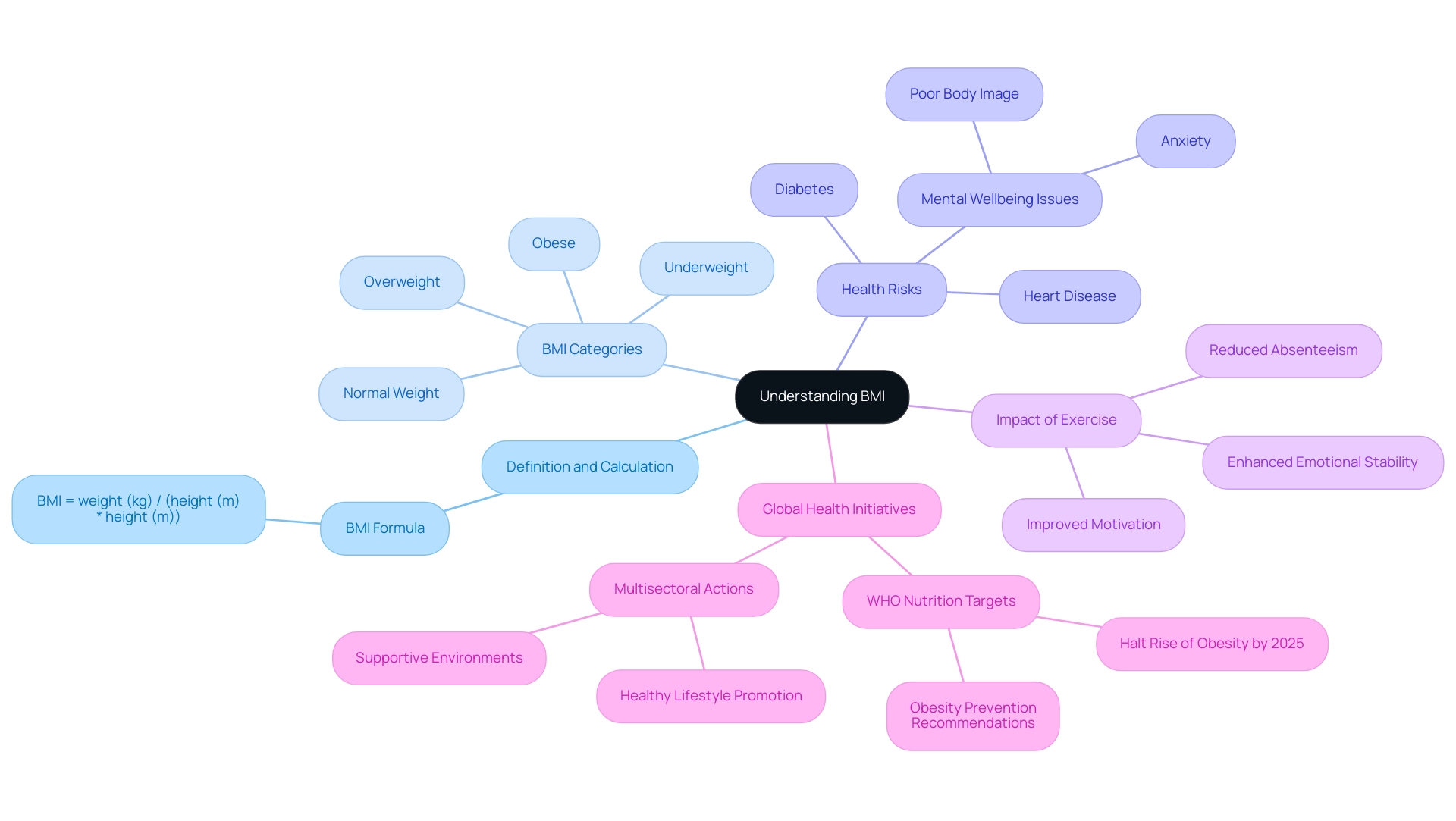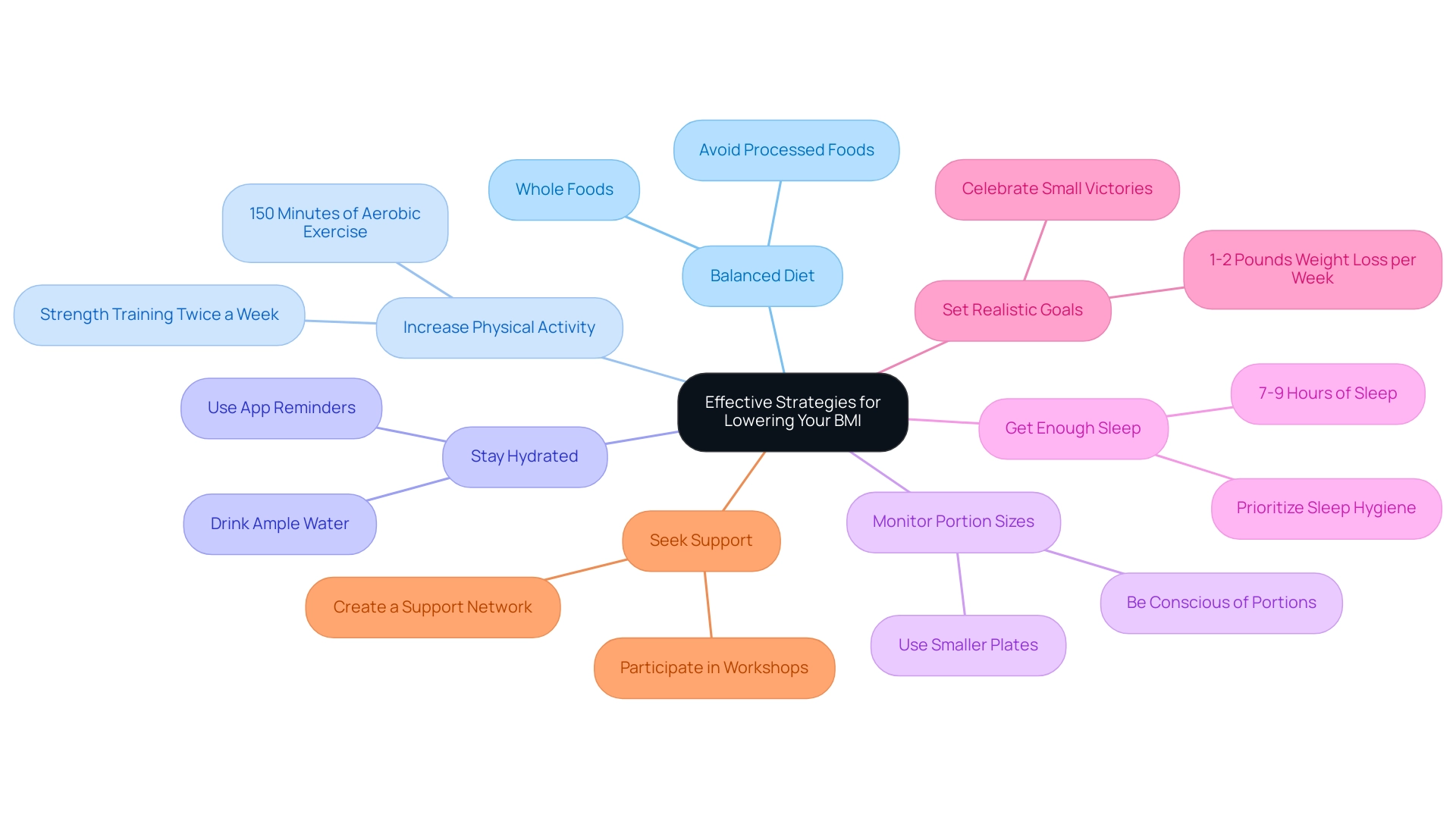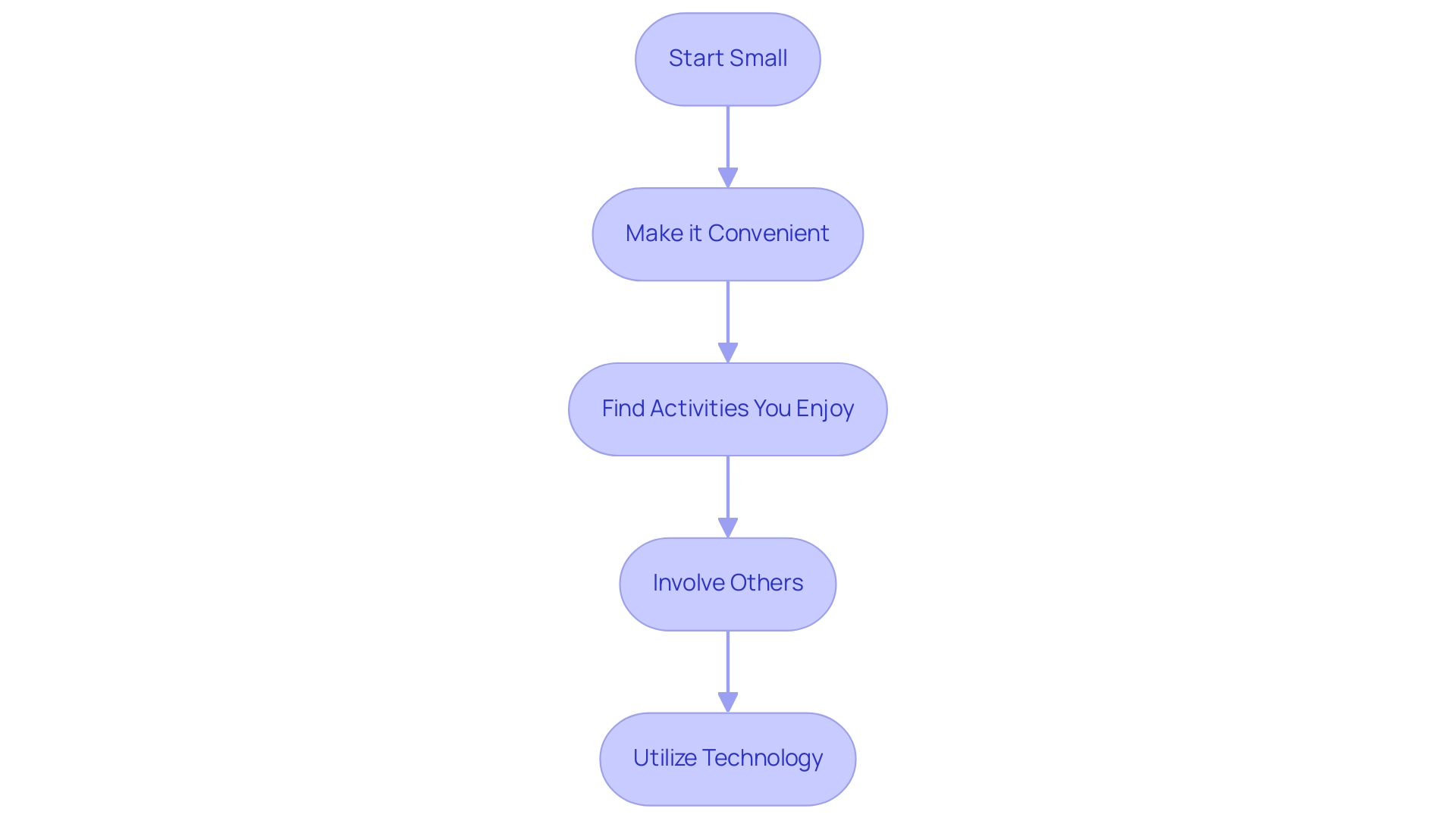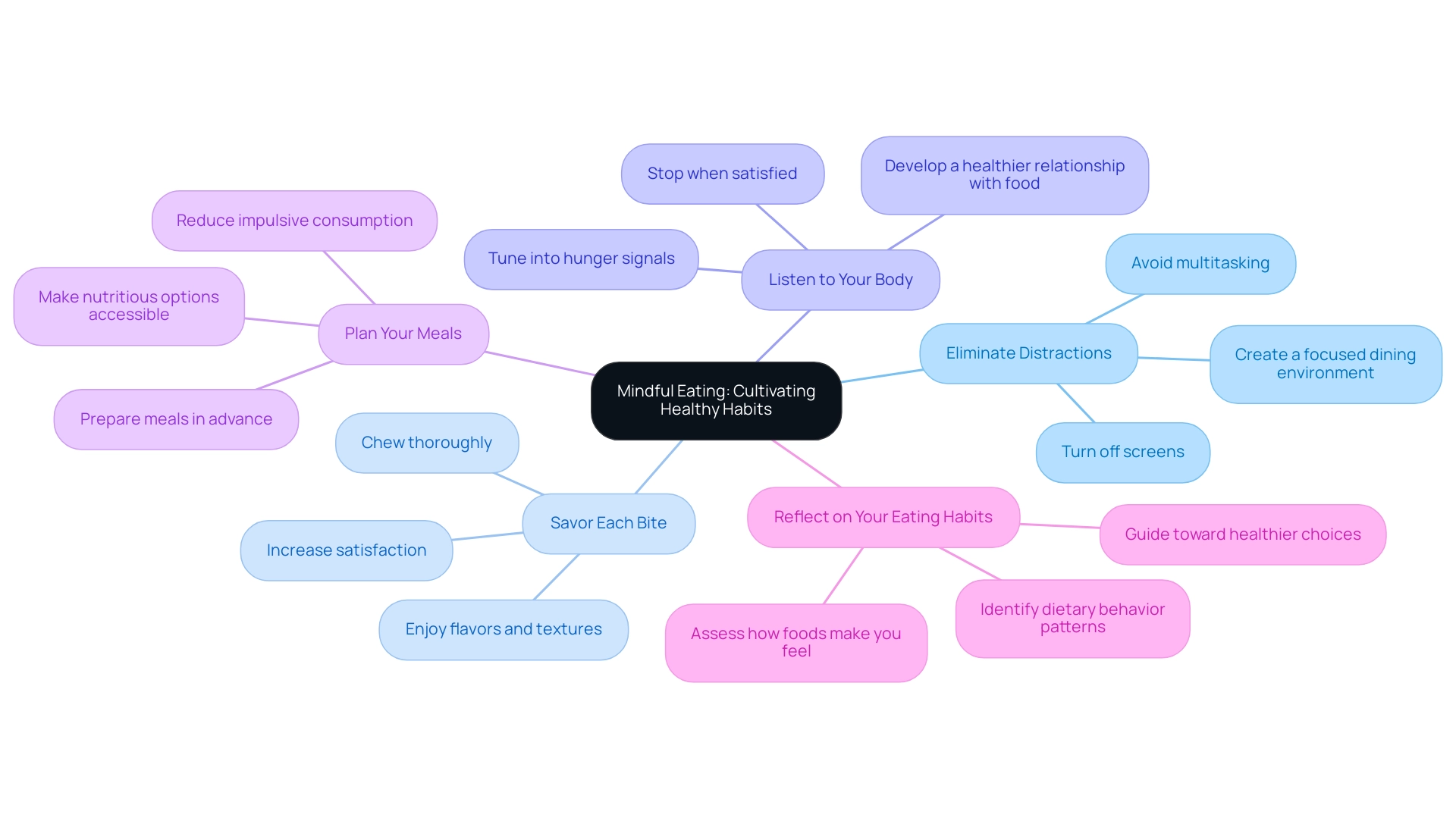Introduction
In the quest for better health, understanding Body Mass Index (BMI) emerges as a critical first step. This simple yet effective measurement serves as a vital indicator of weight-related health risks, pinpointing areas where individuals may need to focus their efforts. As organizations increasingly recognize the importance of employee well-being, the implications of BMI extend beyond personal health, influencing workplace productivity and morale.
By fostering a culture that embraces healthy habits, such as:
- Balanced nutrition
- Regular exercise
- Mindful eating
companies can empower their teams to achieve their health goals. This article delves into practical strategies for managing BMI, enhancing overall wellness, and creating a thriving work environment where employees feel supported and motivated to succeed.
Understanding BMI: The Key to Your Health Goals
Body Mass Index (BMI) serves as a straightforward yet powerful tool that assesses an individual’s weight relative to their height, translating this data into a numeric value that classifies them into categories: underweight, normal weight, overweight, or obese. Mastering how to drop BMI is crucial, as it can reveal potential risks associated with being outside the normal range—such as heart disease, diabetes, and other serious conditions. Furthermore, grasping the stigma and bias surrounding weight is essential, as these elements can result in considerable social and mental wellbeing issues, including anxiety and poor body image.
Recent studies, including one published in the journal 'Workplace Health & Safety,' highlight that employees who engage in regular exercise not only improve their BMI but also report feeling more motivated, engaged, and emotionally stable at work. Specifically, exercise has been associated with reduced absenteeism and presenteeism, leading to a more productive workforce. To compute your BMI, utilize the formula:
BMI = weight (kg) / (height (m) * height (m))
By understanding how to drop BMI, you can establish realistic wellness objectives and monitor your progress effectively. Aiming for a BMI within the normal range (18.5 - 24.9) can result in considerable wellness benefits and improved workplace performance, an essential objective given that the global expenses of overweight and obesity are expected to exceed US$ 18 trillion by 2060. The WHO has recognized the urgency of addressing this crisis and has endorsed global nutrition targets to halt the rise of obesity and diabetes by 2025, along with new recommendations for obesity prevention and management.
Furthermore, effective prevention requires multisectoral actions to create supportive environments that encourage healthy lifestyles, as highlighted in the case study titled 'Prevention and Management Strategies.' Understanding how to drop BMI is an essential step in fostering healthier lifestyles within your organization, ultimately contributing to a more motivated and productive workforce.

Effective Strategies for Lowering Your BMI
To effectively learn how to drop BMI and promote a healthier lifestyle, consider implementing the following strategies, supported by Foresight Health Coaching's comprehensive services:
-
Adopt a Balanced Diet:
Emphasize the inclusion of whole foods—fruits, vegetables, lean proteins, and whole grains—into your daily meals. Successful dietary changes correlate with improved weight-loss outcomes, as noted by experts.
Steer clear of processed foods laden with sugars and unhealthy fats to enhance your nutritional intake. Our personalized nutritional guidance can help tailor dietary programs to fit individual and corporate needs.
-
Increase Physical Activity:
Aim for a minimum of 150 minutes of moderate aerobic exercise weekly.
Activities like brisk walking, cycling, or swimming are essential. Incorporate strength training exercises at least twice a week; building muscle enhances strength and increases calorie expenditure. Our experienced coaches provide tailored fitness coaching to help you meet these goals effectively.
-
Stay Hydrated:
Ensure you drink ample water throughout the day. Staying hydrated is a simple yet effective strategy for weight management. Our app-based delivery method can remind clients to maintain consistent hydration.
-
Monitor Portion Sizes:
Being conscious of portion sizes is vital to prevent overeating. Utilizing smaller plates is a practical tip that can help manage portions effectively, which is a strategy we emphasize in our wellness programs.
-
Get Enough Sleep:
Quality sleep regulates appetite hormones.
Strive for 7-9 hours of restorative sleep each night. Our coaching includes lifestyle recommendations that prioritize sleep for improved well-being outcomes.
-
Set Realistic Goals:
Aim for a gradual weight loss of 1-2 pounds per week.
Foresight Health Coaching emphasizes celebrating small victories to keep clients motivated on their wellness journeys.
-
Seek Support:
Create a support network that includes friends, family, or medical professionals. Sharing your goals with others can provide accountability and encouragement.
Our workshops and webinars foster a community of learning and support, making your wellness journey more enjoyable and effective.
By integrating these strategies into your routine, supported by Foresight Health Coaching's tailored programs, you can discover how to drop BMI significantly. Our corporate memberships include in-person wellness talks, comprehensive pantry and nutrition services, and access to our wellness app, ensuring a holistic approach to well-being in the workplace. Testimonials from pleased clients emphasize the effectiveness of our coaching services, which have transformed their wellness journeys.
For pricing options and to discuss how we can support your organization, please contact us directly. These changes enhance your overall well-being, creating a positive ripple effect in your personal and professional life.

Incorporating Exercise into Your Daily Routine
Incorporating exercise into your daily routine can be a fulfilling and enjoyable experience. To assist with your wellness objectives and those of your team, consider promoting our free 7-day trial of a transformative health coaching app that can help kickstart their journey to a healthier lifestyle. This app offers personalized coaching, activity tracking, and community support to keep users motivated.
Here are some effective strategies to help you stay active:
- Start Small: For those new to exercising, initiating your journey with brief sessions of 10-15 minutes can be a great way to ease into a routine. As you build your endurance, gradually increase the duration to enhance your fitness level.
- Make it Convenient: Opt for activities that seamlessly fit into your schedule. Walking or biking to work, taking the stairs instead of the elevator, or squeezing in a quick workout during your lunch break can be both practical and effective.
- Find Activities You Enjoy: Discover exercises that you genuinely love—be it dancing, hiking, yoga, or team sports. Engaging in activities that bring you joy significantly increases the likelihood of sticking with your routine long-term.
- Involve Others: Exercising with friends or colleagues can greatly enhance motivation and make workouts more enjoyable. Consider forming a walking group or joining group fitness classes to foster a sense of community while being active.
- Utilize Technology: Take advantage of fitness apps or wearable devices to monitor your activity levels and establish attainable targets. Many of these tools provide reminders and challenges, maintaining your involvement and responsibility.
By incorporating these actionable tips into your daily life, you can create a sustainable exercise routine that not only teaches you how to drop BMI but also improves overall well-being. Remember, the journey towards a healthier lifestyle is a gradual process, and every small step counts. With our app, you can access personalized coaching and support, guiding you in reflecting, planning, and executing effective action plans to meet your exercise goals.
Sign up today to start your free trial and transform your team's health!

Mindful Eating: Cultivating Healthy Habits
Mindful consumption is about being fully engaged with your meals, making intentional choices that support your well-being. Here are some effective strategies to cultivate this transformative practice:
- Eliminate Distractions: Create a focused dining environment by turning off screens and avoiding multitasking. Engaging fully with your food enhances the overall experience and helps you appreciate each bite.
- Savor Each Bite: Take your time to chew thoroughly and enjoy the flavors and textures of your food. This mindful approach not only increases satisfaction but also decreases the chances of overeating, allowing you to better recognize when you are full.
- Listen to Your Body: Tune into your body's hunger and fullness signals. Eat when you're genuinely hungry, and learn to stop when you feel satisfied, rather than stuffed. This practice can help you develop a healthier relationship with food over time.
- Plan Your Meals: Preparing meals in advance can significantly reduce impulsive consumption. By having nutritious options easily accessible, you enable yourself to make better dietary choices that align with your wellness objectives.
- Reflect on Your Eating Habits: After meals, take a moment to assess how different foods make you feel. This reflection can reveal patterns in your dietary behavior, guiding you toward healthier choices.
Research indicates that mindful consumption can result in significant health enhancements. For instance, a 2014 study by Youngwanichesetha demonstrated that women with gestational diabetes who participated in a mindful consumption intervention experienced significant reductions in basal glucose, post-prandial glucose, and HbA1c levels compared to a control group. Moreover, mindful consumption interventions have shown a change in mindful consumption from baseline to 12 months, partially mediating the effect on fasting glucose, which explains an estimated 15% of the effect.
Additionally, mindful consumption practices have been associated with a non-significant trend in reducing C-reactive protein levels, a marker of inflammation, with one study reporting significant reduction. Dr. Daubenmier states, "We used ANCOVA to test our prediction that the group assignment would predict changes in consumption of sweets and fasting glucose such that mindfulness intervention participants would report enhanced mindful consumption, reduced consumption of sweets, and reduced fasting glucose at the first post-intervention assessment (6 months), whereas the active control participants would not." By integrating mindful eating into your routine, you can cultivate a healthier connection with food, which is essential for understanding how to drop BMI and reaching your wellness objectives.

Tracking Your Progress and Staying Motivated
To maintain motivation and effectively track your progress on the journey to reducing your waistline, consider implementing the following strategies:
-
Keep a Journal: Regularly documenting your meals, exercise routines, and daily emotions can reveal patterns that contribute to your success. This reflective practice not only enhances awareness but also allows for targeted improvements in your approach, with personalized support from experienced coaches guiding you towards lasting lifestyle changes using evidence-based techniques tailored to your needs.
-
Set Specific Objectives: Establishing clear short-term and long-term wellness targets is crucial. For instance, aim to lose a specific number of pounds within a month or commit to a set number of workout sessions each week. Research shows that individuals who set defined objectives are more likely to achieve their desired outcomes.
Significantly, WW (previously Weight Watchers) has more than 4.5 million members, with participants indicating an average weight reduction of 10% over six months, emphasizing the effectiveness of target setting in weight management, a tactic backed by our skilled coaches.
-
Use Apps and Tools: Embrace technology by utilizing innovative apps designed for weight management. With the diet and nutrition app market witnessing a surge—accounting for 45% of total investment activity in 2023—these tools offer invaluable insights and analytics, enhancing accountability and support throughout your journey. Coupled with the guidance of experienced coaches, these resources can help you stay on track and make informed decisions.
-
Regularly Measure Your BMI: Consistently recalculating your Body Mass Index (BMI) every few weeks can serve as a powerful motivator. Observing tangible changes in your numbers reinforces your commitment and encourages continued progress.
The case study titled 'Changes in Weight Over Time' emphasizes that consistent trackers maintained steady weight loss, while those who tracked sporadically were likely to regain weight, particularly during holiday seasons. Our coaches can assist you in interpreting these numbers and adjusting your strategies accordingly.
-
Celebrate Milestones: Recognizing and rewarding yourself for reaching milestones—no matter how small—can significantly boost your motivation. Celebrating progress encourages a positive mindset and reinforces your dedication to your wellness journey.
With personalized coaching, you can receive the support necessary to celebrate these accomplishments effectively, ensuring that you feel empowered throughout your journey. By actively monitoring your progress and celebrating each achievement, you can sustain your motivation and remain focused on your aim of achieving a healthier BMI.
As Trishita Deb, an expert in healthcare, emphasizes, the journey to health is not just about the outcome but also about the practices that lead to sustainable success. With the right tools and the empowerment that comes from personalized guidance and evidence-based techniques, you can achieve your weight loss goals and inspire those around you.
![]()
Conclusion
Understanding Body Mass Index (BMI) is not merely an academic exercise; it is a vital component of fostering a healthier workplace and enhancing employee well-being. By mastering this simple yet powerful tool, individuals can uncover potential health risks and set realistic health goals, ultimately contributing to a more motivated workforce. The strategies outlined—adopting a balanced diet, increasing physical activity, and practicing mindful eating—offer practical pathways to effectively manage BMI and promote overall wellness.
Incorporating exercise into daily routines and embracing mindful eating practices can lead to significant improvements in both personal health and workplace productivity. Moreover, tracking progress and celebrating milestones can keep motivation high, encouraging a culture of health within organizations. As companies invest in their employees' well-being, the benefits extend beyond individual health to encompass greater workplace morale, reduced absenteeism, and enhanced performance.
Now is the time for HR Benefits Managers to take action. By prioritizing health initiatives that support BMI management, organizations can empower their teams to thrive. A commitment to fostering healthy habits will not only improve individual health outcomes but also create a positive ripple effect throughout the workplace, leading to a more engaged and productive workforce. Embracing this holistic approach to health is essential for success in today's fast-paced work environment.
Frequently Asked Questions
What is Body Mass Index (BMI) and why is it important?
BMI is a tool that assesses an individual's weight relative to their height, categorizing them as underweight, normal weight, overweight, or obese. Understanding BMI is important as it can indicate potential health risks such as heart disease and diabetes.
How can I calculate my BMI?
You can calculate your BMI using the formula: BMI = weight (kg) / (height (m) * height (m)).
What are the health risks associated with high BMI?
A high BMI can be associated with serious health conditions, including heart disease, diabetes, and other significant health issues.
What are the benefits of reducing BMI?
Aiming for a BMI within the normal range (18.5 - 24.9) can lead to substantial wellness benefits, improved workplace performance, and reduced absenteeism.
What role does exercise play in managing BMI?
Regular exercise not only helps improve BMI but also enhances motivation, engagement, and emotional stability at work, contributing to a more productive workforce.
What strategies can help in dropping BMI?
Effective strategies include adopting a balanced diet, increasing physical activity, staying hydrated, monitoring portion sizes, getting enough sleep, setting realistic goals, and seeking support.
How much physical activity is recommended to manage BMI?
It is recommended to engage in at least 150 minutes of moderate aerobic exercise weekly, along with strength training exercises at least twice a week.
Why is mindful consumption important for managing BMI?
Mindful consumption helps individuals make intentional food choices, enhances the eating experience, and can lead to better recognition of hunger and fullness signals, assisting in weight management.
How can I stay motivated while trying to reduce my BMI?
Keeping a journal, setting specific objectives, using apps and tools, regularly measuring BMI, and celebrating milestones can all help maintain motivation during your weight loss journey.
What support options are available for individuals looking to reduce their BMI?
Support options include personalized coaching, wellness programs, workshops, and community support through apps designed for weight management.

